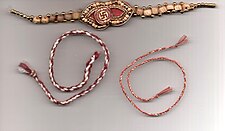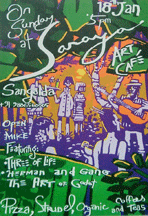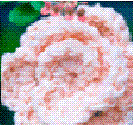 This is an ancient tradition. Bhavishya Purana refers to a battle between gods and demons, and Indra (the king of the gods) was feeling depressed. At that time Indra's wife Sachi took a thread, charged it with sacred verses or Mantras for protection and tied it on Indra's hand. Through the strength of this thread Indra conquered his enemies. Since then till today this festival is celebrated. This year it falls on 13th August, 2011.
This is an ancient tradition. Bhavishya Purana refers to a battle between gods and demons, and Indra (the king of the gods) was feeling depressed. At that time Indra's wife Sachi took a thread, charged it with sacred verses or Mantras for protection and tied it on Indra's hand. Through the strength of this thread Indra conquered his enemies. Since then till today this festival is celebrated. This year it falls on 13th August, 2011.Through the passage of time festivals celebrations are undergoing changess. Raksha Bandhan is also known as Rakhi. Rakhi has become a festival for sisters and brothers. Sisters tie them to their brothers. During the middle ages, if a woman tied a Rakhi on the hand of any man, then it became imperative for him, as his religious duty of the highest order, to protect that woman. That man would put his life at stake to protect the honor of that woman.
In those days, many Rajputs sacrificed their lives to protect their spiritual sisters. Humayun received a Rakhi from the queen Karmavati of Chittor and for that, Humayun carried out his sacred brotherly duty and protected her by opposing his own soldiers.
According to ancient traditions, it is customary to have protection threads that are charged with sacred verses (Mantras) and sanctified with rice, durva grass etc.; to have these tied by people who know the Vedas or by near and dear ones. This protection thread saves from sins on the one hand and removes diseases on the other hand. By tying this thread, protection is afforded for a full one year and all kinds of fears are removed.
Nowadays Rakhis are decorated with soft silky threads of various colours, and also with ornaments, pictures, gold and silver threads etc. These Rakhis enhance the artistry of the people. Within these Rakhis reside sacred feelings and well wishes. Acting as a symbol of life's advancement and a messenger of togetherness.
The central ceremony involves the tying of a rakhi (sacred thread) by a sister on her brother's wrist. This symbolizes the sister's love and prayers for her brother's well-being, and the brother's lifelong vow to protect her
The brother in return offers a gift to his sister and vows to look after her as she presents sweets to her brother. The brother and sister traditionally feed one another sweets. Since North Indian kinship practices give cousins a status similar to siblings, girls and women often tie the rakhi to their male cousins as well (referred to as cousin-brothers in regional parlance) in several communities. Unrelated boys and men who are considered to be brothers (munh-bola bhai or adopted brothers) can also be tied rakhis, provided they commit to a lifelong obligation to provide protection to the woman or girl.
Narali Purnima
In western India and parts of Maharashtra, Gujarat, and Goa this day is celebrated as Narali Purnima. On this day, an offering of a coconut (naral in Marathi) is made to the sea, as a mark of respect to Lord Varuna, the God of the Sea. Narali Purnima marks the beginning of the fishing season and the fishermen, who depend on the sea for a living, make an offering to Lord Varuna so that they can reap bountiful fish from the sea
| < Prev |
|---|
















